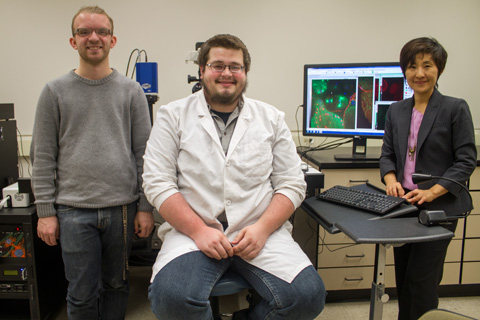
|
| Ph.D. students Jeff Medley and Mike Stubenvoll are working with Dr. Song to study various research aims of her long-term research goals in centrosome regulation, and assisting her with producing data for external grant applications and research papers. Both students will also supervise the undergraduates in their independent research project. |
Ph.D. students and an assistant professor at Oakland University are impacting the course of human diseases through cell biology research.
“Through intense training, Oakland’s Ph.D. students have been producing meaningful biological data to provide new findings, which we hope, ultimately benefits human health,” said Assistant Professor of
Biological Sciences Dr. Mi Hye Song.
“Furthermore, my research provides opportunity for Ph.D. students to mentor undergraduate students in preparation for future independent research.”
Dr. Song teaches biochemistry at OU and facilitates research with undergraduate and graduate students. Her laboratory studies focus on centrosome regulation.
Researching the cause
The centrosome is a tiny cellular organelle that helps maintain an accurate amount and content of genetic materials as cells divide. If an error occurs during the cell division process it can cause genomic instability, a feature found in the genome of many cancer patients.
Dr. Song’s research focuses on understanding the molecular and genetic mechanisms of centrosome assembly, hoping to enhance our knowledge of human diseases in which this process goes awry.
“Despite dramatic recent progress, we are still far from a full comprehension of centrosome biogenesis and its link to the cell cycle,” Dr. Song said.
“Our laboratory is applying a combination of biochemistry, cell biology, genetics, proteomics and quantitative imaging to the study of centrosome biology in the nematode Caenorhabditis elegans model.”
This C. elegans model is an organism used for pursuing research in developmental biology. Dr. Song has used a particular model that has gained global recognition in centrosome research.
Dr. Song recently traveled to Nara, Japan to meet with other researchers at the C. elegans Development, Cell Biology and Gene Expression meeting in association with the 6th Asia-Pacific C. elegans meeting, where she was invited to help organize the event. Along with selecting abstracts, Dr. Song chaired the cell polarity section on site, was nominated to judge poster awards and was selected as a speaker in cell division where she presented recent progress of her research.
Grad students working with undergrads in the lab
This fall, Dr. Song continues to share her knowledge and research endeavors with two Ph.D. and five undergraduate students.
Ph.D. students in
Biological and Biomedical Sciences Jeff Medley and Mike Stubenvoll are working with Dr. Song to study various research aims of her long-term research goals in centrosome regulation, and assisting her with producing data for external grant applications and research papers. Both students will also supervise the undergraduates in their independent research project.
“It is a great experience for both the graduate and undergraduate students because we have to make sure they understand what experiments they are doing, how they can do them, and why they are doing it," Medley said. "It really tests us on how well we know what is going on.”
Medley began working in Dr. Song's research laboratory last year as an undergraduate student. This experience prompted his decision to continue research at a graduate level.
“The research is really exciting, and I was able to jump right in as an undergraduate and conduct really high level research,” Medley said.
“Our research is relevant to the National Institute of Health's mission that pertains to developing knowledge that will help developing diagnostic and therapeutic inventions for human diseases,” Dr. Song said. “My Ph.D. students are an essential part of these research activities.”
— by Kelli M. Titus
